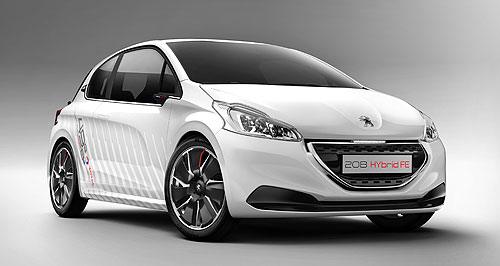Make / Model Search
Future models - Peugeot - 208 - Hybrid FEFrankfurt show: Peugeot details frugal 208 Hybrid FEFuel for love: Peugeot collaborated with French oil and gas giant Total to produce the 208 Hybrid FE. Peugeot’s lightweight 208 Hybrid FE Frankfurt concept sips 2.1L/100kmGallery Click to see larger images 2 Sep 2013 PEUGEOT has previewed its lightweight 208 Hybrid FE conventional hybrid concept, with average fuel use of just 2.1 litres per 100 kilometres, ahead of an official unveiling at Frankfurt next week. The petrol-electric concept is based on a European-spec 1.0-litre 208 VTi hatch, and images reveal it has developed significantly from the shell that was used to showcase the vehicle’s technology at the Geneva motor show earlier this year. Styling changes from the standard 208 donor car are mostly focussed on the rear end, with darkened tail-lights and a sharper, cut-off look for the redesigned tailgate, contrasting black and white colour scheme and a rear diffuser for improved air flow. Peugeot has further improved the aerodynamics of the 208, with a 25 per cent reduction on coefficient of drag to 0.25, which Peugeot says is due in part to the skinny 19-inch wheels. A number of weight-saving measures have lopped almost 200kg off the standard 208, including the use of carbon-fibre and composite body panels and a fuel tank capacity halved to 20 litres. As previously reported, the 208 FE is the result of a collaboration between Peugeot and French oil and gas giant Total. The aim of the joint venture was to develop a vehicle that improves on fuel efficiency without taking away the performance and acceleration speed of the donor car. According to Peugeot, the frugal French hatch can dash from zero to 100km/h in eight seconds, just 1.2 seconds slower than that of its 147kW/275Nm 208 GTi hot-hatch sibling. Peugeot has re-calibrated the 1.0-litre three-cylinder engine from the 208 VTi, boosting it to 1.2-litres for a 50kW power output, combined with a 25kg lithium-ion battery housed under the rear bench and an electric motor taken from Peugeot Sport’s Le Mans racing car. The petrol-electric drivetrain is matched with a five-speed semi-automatic transmission. The Pug is a conventional hybrid, meaning it cannot be charged from an external source a la the Holden Volt. The 2.1L/100km fuel consumption figure marks a 10 per cent improvement over the non-hybrid 1.0-litre power-plant’s European cycle figure, while the Hybrid FE can travel on electric power alone for up to 19 kilometres. Peugeot is claiming CO2 emissions of 49 grams per kilometre, half that of the regular 1.0-litre 208. Currently the most economical engine available in the Australian 208 line-up is the 60kW 1.2-litre three-cylinder petrol Active that sips 4.7L/100km and produces 109g/km of CO2 emissions. A unique front and rear suspension set-up replaces the springs, lower wishbones and anti-roll bar with specially made fiberglass ‘blades’ reducing the overall weight by another 20kg. Peugeot says the Hybrid FE has not compromised on cabin space thanks to the location of the battery, and it can still carry five people with luggage, although it did remove the air conditioning because of its impact on fuel consumption. Peugeot Sport technical manager of the 208 Hybrid FE project, Christophe Mary, said the two companies collaborated well on the ambitious project, eventually achieving the initial aim. “At the beginning of the project, the objective seemed very ambitious, of a very high level,” he said. “It was! The two partners, Peugeot and Total, achieved it by combining their technological expertise. “Peugeot Sport has contributed its expertise to the project and has identified new areas of development. Production and competition are progressing together.” The French car-making giant has not confirmed whether the Hybrid FE will go into full-scale production, but further details will be revealed at its launch on September 10. The petrol-electric 208 will sit alongside the recently revealed 200kW/330Nm 308 R hot-hatch at this year’s show.  Read more27th of August 2013  Frankfurt show: Peugeot unleashes 200kW 308 RPeugeot ready to battle Golf GTI and R, Ford Focus ST with 200kW 308 R conceptAll future models Alfa Romeo Alfa Romeo Abarth Abarth Alpine Alpine Alpina Alpina Audi Audi Aston Martin Aston Martin BMW BMW Bentley Bentley Chery Chery Brabham Brabham Chrysler Chrysler Chevrolet Chevrolet Cupra Cupra Citroen Citroen DS DS Dodge Dodge Fiat Fiat Ferrari Ferrari Foton Foton Ford Ford Great Wall Great Wall FPV FPV Haval Haval GWM GWM Honda Honda Holden Holden Hummer Hummer HSV HSV Infiniti Infiniti Hyundai Hyundai Jaguar Jaguar Isuzu Isuzu Kia Kia Jeep Jeep Land Rover Land Rover Lamborghini Lamborghini Lexus Lexus LDV LDV Mahindra Mahindra Lotus Lotus Mazda Mazda Maserati Maserati Mercedes-AMG Mercedes-AMG McLaren McLaren MG MG Mercedes-Benz Mercedes-Benz Mitsubishi Mitsubishi Mini Mini Opel Opel Nissan Nissan Peugeot Peugeot Pagani Pagani Proton Proton Porsche Porsche Renault Renault Ram Ram Rover Rover Rolls-Royce Rolls-Royce Skoda Skoda Saab Saab SsangYong SsangYong Smart Smart Suzuki Suzuki Subaru Subaru Toyota Toyota Tesla Tesla Volvo Volvo208 pricing
Motor industry news |
Click to sharePeugeot modelsResearch Peugeot All future models Alfa Romeo Alfa Romeo Abarth Abarth Alpine Alpine Alpina Alpina Audi Audi Aston Martin Aston Martin BMW BMW Bentley Bentley Chery Chery Brabham Brabham Chrysler Chrysler Chevrolet Chevrolet Cupra Cupra Citroen Citroen DS DS Dodge Dodge Fiat Fiat Ferrari Ferrari Foton Foton Ford Ford Great Wall Great Wall FPV FPV Haval Haval GWM GWM Honda Honda Holden Holden Hummer Hummer HSV HSV Infiniti Infiniti Hyundai Hyundai Jaguar Jaguar Isuzu Isuzu Kia Kia Jeep Jeep Land Rover Land Rover Lamborghini Lamborghini Lexus Lexus LDV LDV Mahindra Mahindra Lotus Lotus Mazda Mazda Maserati Maserati Mercedes-AMG Mercedes-AMG McLaren McLaren MG MG Mercedes-Benz Mercedes-Benz Mitsubishi Mitsubishi Mini Mini Opel Opel Nissan Nissan Peugeot Peugeot Pagani Pagani Proton Proton Porsche Porsche Renault Renault Ram Ram Rover Rover Rolls-Royce Rolls-Royce Skoda Skoda Saab Saab SsangYong SsangYong Smart Smart Suzuki Suzuki Subaru Subaru Toyota Toyota Tesla Tesla Volvo Volvo208 pricing
Motor industry news |















Facebook Twitter Instagram